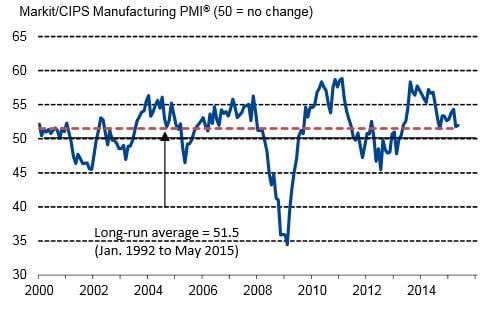Pound Falls Against Dollar on Manufacturing PMI, Strong GBP Seen Hurting Exports
The pound sterling has pared its Monday morning gains on news that the UK manufacturing sector did not grow as fast as expected in May.
APSCo have released data on Monday revealing that median salaries across all professional sectors continue to climb steadily.
The Markit/CIPS Manufacturing PMI read at 52 in May, markets had priced the pound exchange rate complex higher on expectations for a reading of 52.5. The miss is not a big one, but a miss nevertheless.
In the wake of the release the pound v euro conversion rate fell from a morning high of 1.3994 to 1.3976. Despite the falls the trend higher does still however appear to be preffered by longer-term studies of this pair.
Losses against the US dollar were more noted with GBP declining from 1.5304 to 1.5239.
The data comes a day after the CBI reported UK economic growth was accelerating once more. The CBI report did however suggest the majority of UK growth is being delivered by the services sector which accounts for over 70% of economic activity.
David Noble, Group Chief Executive Officer at the Chartered Institute of Procurement & Supply says:
“Though hopes of a stronger pace of recovery were dashed by manufacturing this month, the sector resisted repeating April’s sharp slowdown and instead delivered a further modest easing in the growth rate of activity.
“Overall, the sector’s enduring driver continued to be domestic demand, as exports failed to ignite any new highs in recovery. This uninspiring level of activity is likely to cast a shadow in the coming months and encourage expectations of a flat-lining future.”
The inability of exports to contribute to the UK economic story will certainly have much to do with the recovering strength of the pound sterling – something echoed in the already mentioned CBI report and something cited by the Bank of England in various communications.
Indeed, the Bank of England stated in their May Quarterly Inflation Report that their interest rate settings are indeed factoring in the strength of the British pound. Interest rate rises will only stoke the UK currency higher, and as such the Bank could well delay raising rates to keep a cap on the currency.
Average salaries continue to climb
A strong sterling aside, the Bank of England sees wage growth as being one of the key factors behind their thinking on UK interest rates - rising wages will ultimately trigger the cycle of interest rate rises on the horizon, a positive for the British pound which would benefit from the currency flows the higher interest rates would attract.
The Association of Professional Staffing Companies (APSCo) have released data on Monday revealing that median salaries across all professional sectors continue to climb steadily, increasing by 2.9% year-on-year. This figure is characterised by notable fluctuations in terms of sector, with engineering and finance, for example, recording uplifts of 7.3% and 2.3% respectively. This rise in remuneration is mirrored by statistics from the ONS which reported that average earnings grew at an annual rate of 2.2% in the three months to February 2015.
Ann Swain, Chief Executive of APSCo comments:
“The continued rise in employment levels, and associated positivity in the market, is almost tangible to those working within the recruitment profession. It’s no surprise that finance and accounting vacancies remain strong - according to a recent report published by the House of Commons, financial and insurance services contributed £126.9 billion to the UK economy last year.
“Greater stability post-election – indicated by the fact that brokers are confident that HSBC and Standard Chartered are not set to leave London in the immediate future - means that this upward trend looks set to continue.”
We see wage growth as likely to supersede concerns over exchange rate strength with the BoE’s decision makers. While the APSCo data is certainly third tier in nature it does serve to confirm that underlying economic trends are supportive of a stronger British pound.






